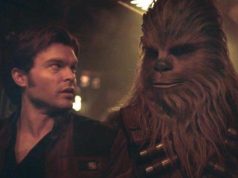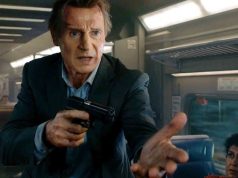Look, nobody knows why Denzel Washington keeps starring in Tony Scott films, or why the pair of them would make two consecutive movies about runaway trains. It is pointless to speculate. The fact is, “Unstoppable” is here, 15 months to the day after “The Taking of Pelham 1 2 3,” and it’s as slick and entertaining as an action flick about a runaway train has any right to be.
Washington plays Frank Barnes, a veteran engineer for a railroad in Pennsylvania. On the day in question, he’s partnered with a rookie conductor named Will Colson (Chris Pine) on a routine trip pulling a couple dozen cars. Meanwhile, at another train yard, a bumbler (played by Ethan Suplee) has let loose a half-mile-long cargo train without a driver. By itself, that’s not a terrible crisis; if the train is coasting, you just have to catch up with it, jump aboard, and pull the brake. But it turns out this one is under power — not just coasting — and it’s also carrying like a million pounds of explosives. In 60 miles it’ll come to an S-curve in the tracks, where its unchecked speed will almost certainly cause it to derail, blow up, kill the whole town, etc.
The onscreen claim of “inspired by true events” is more accurate here than it often is. The basics of the story — the problem, the explosive potential, the eventual solution — are essentially true, though they happened in Ohio rather than Pennsylvania, and Denzel Washington was (allegedly) not involved. Scott, known for his whip-fast editing and abuse of hand-held cameras, shows some restraint here, comparatively speaking, and his penchant for eye-catching visuals actually comes in handy. The trains may be moving fast, but they are essentially unchanging, claustrophobic locations that would become dull if they weren’t shot from a variety of angles.
The screenplay, by Mark Bomback (“Godsend”), is packed with enough plausible-sounding rail jargon to convince me that it knows what it’s talking about. (Not that it would take much to convince me. I’ll be honest, I didn’t realize “engineer” and “conductor” were two different things until now.) Most of the “why don’t they try this?/what about that?” questions that a viewer will have are addressed. The film paints a picture of railway operations that feels authentic.
But the script is also stuffed with Hollywoodized details, which Scott is only too happy indulge. Frank is two weeks away from retirement; a train full of field-tripping kids is in harm’s way; the cranky old engineer who argues with Will is the one whose life is in peril later; volatile material is stored right next to where the train might derail; company bureaucrats butt heads with earnest technicians over profit losses; the runaway locomotive is “a missile the size of the Chrysler Building”; you get the idea. Frank’s worried daughters and Will’s estranged wife watch the news unfold on TV (and by the way, the TV news reporters have miraculously speedy access to everyone involved). Elements like these are emphasized more than they need to be, suggesting someone didn’t think the core story would be gripping enough if it weren’t tarted up.
That sort of nonsense doesn’t detract too much from the basics, though. Boiled down to its essential elements, it’s a story that almost can’t go wrong: clear objectives, clear obstacles, clear decisions. What makes it or breaks it is the skill with which the story is told. Washington has his well-established movie-star magnetism; Pine has that Capt. Kirk charisma; Rosario Dawson, Kevin Corrigan, and Lew Temple are all useful in supporting roles. The screenplay is intense and serious but not heavy-handed or preposterous; the direction is focused and confident. “Unstoppable” doesn’t transcend its genre — it isn’t a showcase for great acting; it doesn’t comment on the human condition; it isn’t a metaphor for anything — but it uses the tools of that genre effectively. Popcorn, yeah. But GOOD popcorn.
B (1 hr., 38 min.; )





